Related Research Articles

John Thomas Sladek was an American science fiction author, known for his satirical and surreal novels.
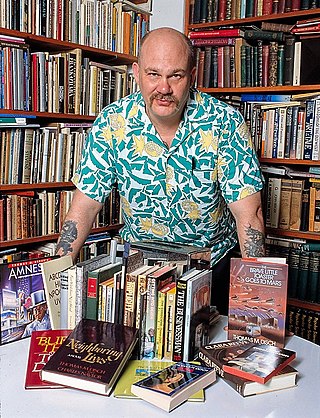
Thomas Michael Disch was an American science fiction writer and poet. He won the Hugo Award for Best Related Book – previously called "Best Non-Fiction Book" – in 1999, and he had two other Hugo nominations and nine Nebula Award nominations to his credit, plus one win of the John W. Campbell Memorial Award, a Rhysling Award, and two Seiun Awards, among others.

John Joseph Vincent Kessel is an American author of science fiction and fantasy. He is a prolific short story writer, and the author of four solo novels, Good News From Outer Space (1989), Corrupting Dr. Nice (1997), The Moon and the Other (2017), and Pride and Prometheus (2018), and one novel, Freedom Beach (1985) in collaboration with his friend James Patrick Kelly. Kessel is married to author Therese Anne Fowler.
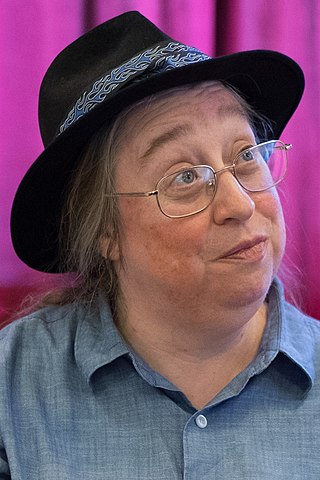
Jo Walton is a Welsh and Canadian fantasy and science fiction writer and poet. She is best known for the fantasy novel Among Others, which won the Hugo and Nebula Awards in 2012, and Tooth and Claw, a Victorian-era novel with dragons which won the World Fantasy Award in 2004. Other works by Walton include the Small Change series, in which she blends alternate history with the cozy mystery genre, comprising Farthing, Ha'penny and Half a Crown. Her fantasy novel Lifelode won the 2010 Mythopoeic Award, and her alternate history My Real Children received the 2015 Tiptree Award.

David Rowland Langford is a British author, editor, and critic, largely active within the science fiction field. He publishes the science fiction fanzine and newsletter Ansible and holds the all-time record for most Hugo Awards, with a total of 29 wins.

Interzone is a British fantasy and science fiction magazine. Published since 1982, Interzone is the eighth-longest-running English language science fiction magazine in history, and the longest-running British science fiction (SF) magazine. Stories published in Interzone have been finalists for the Hugo Awards and have won a Nebula Award and numerous British Science Fiction Awards.
Michael Lawson Bishop was an American author. Over five decades and in more than thirty books, he created what has been called a "body of work that stands among the most admired and influential in modern science fiction and fantasy literature."
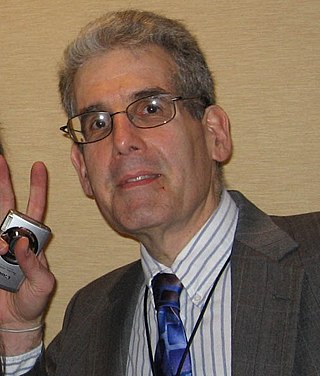
Scott Edelman is an American science fiction, fantasy, and horror writer and editor.
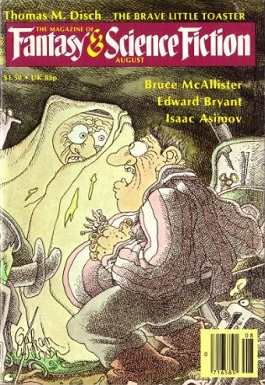
The Brave Little Toaster is a 1980 novella by American writer Thomas M. Disch intended for children or, as put by the author, a "bedtime story for small appliances". The story centers on a group of five household appliances—a tensor lamp stand, an electric blanket, an AM radio alarm clock, a vacuum cleaner and a toaster—on their quest to find their original owner referred to as the Master.
There have been many attempts at defining science fiction. This is a list of definitions that have been offered by authors, editors, critics and fans over the years since science fiction became a genre. Definitions of related terms such as "science fantasy", "speculative fiction", and "fabulation" are included where they are intended as definitions of aspects of science fiction or because they illuminate related definitions—see e.g. Robert Scholes's definitions of "fabulation" and "structural fabulation" below. Some definitions of sub-types of science fiction are included, too; for example see David Ketterer's definition of "philosophically-oriented science fiction". In addition, some definitions are included that define, for example, a science fiction story, rather than science fiction itself, since these also illuminate an underlying definition of science fiction.
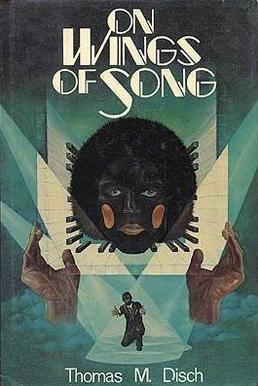
On Wings of Song is a 1979 science fiction novel by American writer Thomas M. Disch. It was first published as a serial in The Magazine of Fantasy & Science Fiction in three installments in February to April 1979. Like Disch's previous novel 334, it is a bitter satire that depicts a near-future America falling into worsening economic and social crisis. Despite being critically well received, it was a commercial failure.

Pyr was the science fiction and fantasy imprint of Prometheus Books, launched in March 2005 with the publication of John Meaney's Paradox. In November 2018 it was sold to Start Publishing.
"The Great Wall of Mexico" is a science fiction short story by American writer John Sladek. It was first published in the 1973 anthology Bad Moon Rising: An Anthology of Political Forebodings edited by Thomas M. Disch. It was also published in Sladek's 1977 collection Keep the Giraffe Burning and uploaded to the online science fiction magazine Sci Fiction on December 21, 2005.

The Hugo Award is an annual literary award for the best science fiction or fantasy works and achievements of the previous year, given at the World Science Fiction Convention (Worldcon) and chosen by its members. The Hugo is widely considered the premier award in science fiction. The award is administered by the World Science Fiction Society. It is named after Hugo Gernsback, the founder of the pioneering science fiction magazine Amazing Stories. Hugos were first given in 1953, at the 11th World Science Fiction Convention, and have been awarded every year since 1955.

Science Fiction: The 100 Best Novels, An English-Language Selection, 1949–1984 is a nonfiction book by David Pringle, published by Xanadu in 1985 with a foreword by Michael Moorcock. Primarily, the book comprises 100 short essays on the selected works, covered in order of publication, without any ranking. It is considered an important critical summary of the science fiction field.
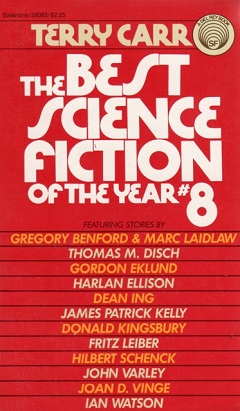
The Best Science Fiction of the Year #8 is an anthology of science fiction short stories edited by Terry Carr, the eighth volume in a series of sixteen. It was first published in paperback by Del Rey Books in July 1979, and in hardcover by the same publisher in conjunction with the Science Fiction Book Club in August 1979. The first British edition was issued by Gollancz in the same year.
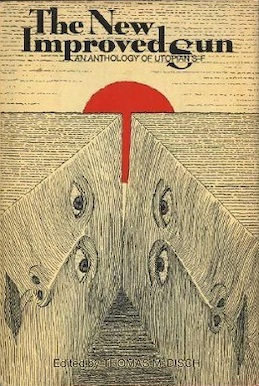
The New Improved Sun: An Anthology of Utopian S-F is an anthology of science fiction stories edited by American writer Thomas M. Disch, published in hardcover by Harper & Row in 1975. Second edition published by Hutchinson in 1976. Many of the stories are original to the volume.

Six-Gun Snow White is a 2013 fantasy novella by Catherynne M. Valente, retelling the story of Snow White in a mythical version of the Old West. It was published by Subterranean Press.
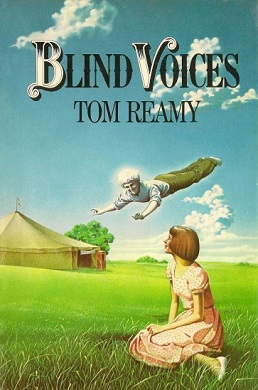
Blind Voices is a 1978 science fiction novel by Tom Reamy. Reamy's only novel, it was published "posthumously in a complete but not final draft" by Berkley Books.
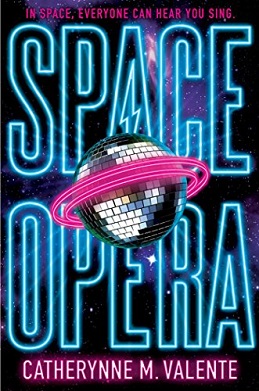
Space Opera is a 2018 science fiction novel by Catherynne Valente, about a galactic version of the Eurovision Song Contest. It was first published by Saga Press.
References
- ↑ 1979 Hugo Awards, at TheHugoAwards.org; retrieved June 19, 2018
- ↑ Four Reasons for Reading Thomas M. Disch, by John Sladek, originally published in The Stellar Gauge: Essays on Science Fiction Writers (Norstrilia Press, 1980); archived at Ansible Editions; retrieved June 19, 2018
- ↑ THE BEST FROM FANTASY AND SCIENCE FICTION: 23rd Series, reviewed at Kirkus Reviews ; originally published May 23, 1980; retrieved June 19, 2018
- ↑ FSF7//Crowley/Elgin/Carr/Zebrowski, reviewed in The Magazine of Fantasy and Science Fiction (April 1980); archived in Strokes (published November 24, 2016, by Orion Publishing Group)
- ↑ Unearthing my 1984 interview with Thomas M. Disch, by Scott Edelman, originally published in Last Wave #5 (Winter 1986); excerpt archived at ScottEdelman.com, March 1 2015; retrieved June 19, 2018